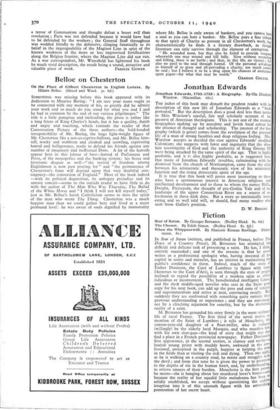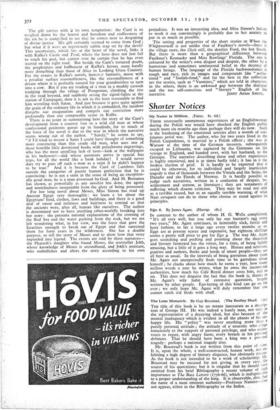Fiction
When the Whippoorwill. By Marjorie Kinnan Rwailings. (Heine- mann. 8s.)
IN Star of Satan (written, and published in France, before The Diary of a Country Priest), M. Bernanos has attempted the difficult and delicate task of presenting a saint. He has, I think, entirely succeeded ; and one of the reasons is that he never writes as a professional apologist who, having invested all his capital in saints and miracles, has an interest in maintaining the public's confidence in them. Indeed, much of the story of Father Donissan, the Cure of Lumbres (a figure with some likenesses to the Cure d'Ars), is seen through the eyes of people inclined to regard the possibility of a modern saint as either ridiculous or inconvenient. The broadminded intelligent Canon, and the sleek middle-aged novelist who sees in the Saint go' copy for his next book, can add up the pros and cons of sancta' and supernaturalism and arrive at neat, convincing results. But suddenly they are confronted with something quite outside their previous understanding or experience ; and they are convinced, not by a clinching argument for sanctity, but by the shattering reality of a saint. M. Bernanos has grounded his story firmly in the most ordinal/ life of rural France. The first third of the novel makes no mention of the Saint of Lumbres ; it tells of Mouchette, the sixteen-year-old daughter of a flour-miller, who is seduced (willingly) by the elderly local Marquis, and who murders him with his own shot-gun—the kind of story that might any day find a place in a French provincial newspaper. Father Donissan s' first appearance, in the second section, is clumsy and earthy-4 loutish young priest with muddy boots, awkward in the coo" fessional, uninspired in the pulpit, happier at helping the .5161 in the fields than at visiting the sick and dying. Then one night' as he is walking on a country road, he meets and struggles svl e the devil ; and from that time he is given the power to penetrate to the depths of sin in the human heart, and, by understandal& to relieve sinners of their burden. Mouchette is the first pell°11 he meets—she is hanging about her murdered lover's house--aou because the reality of her squalid little melodrama has been 50 solidly established, we accept without questioning the sudden irruption into it of this uncouth figure with his astontanwo penetration of her secret heart. The gift carries with it its own temptation : the Cure is so weighed down by the horror and boredom and endlessness of the sin he is compelled to see that he comes near to despairing of divine justice. His gift certainly seemed to come from God ; but what if it were an ingeniously subtle trap set by the devil? This uncertainty, which lies at the heart of the novel, links it with Kafka's Castle and Trial, where the hero does not just fail to reach his goal, but cannot ever be certain that he has even started on the right road. But beside the Cure's tortured doubt, the perplexities and bafflement of Kafka's heroes seem hardly more disturbing than those of Alice in Looking Glass Country. For the events in Kafka's novels, howev:er fantastic, move with a peculiar surface reasonableness, like the reasonableness of a dream where it is perfectly natural for your grandmOther to turn into a cow. But if you are reading of a man in a muddy cassock trudging through the village of Pomponne, climbing the rise in the road beyond, and suddenly seeing the signal-lights at the station of Campagne, then it is not in the least reasonable to find him wrestling with Satan. And just because it goes quite against the grain of the ordinary life in which it is embedded, the incident disturbs our imagination and compels our conviction more profoundly than any comparable scene in Kafka. There is no point in summarising here the story of the Cure's development from a country lout to a wild old man at whose confessional penitents queue up in hundreds, for so much of the force of the novel is due to the way in Which the narrative seems wrung out of the author. " Surely," he seems to say, " if I'd tried to invent a Saint I could have thought of something more convincing than this crude old man, who uses one of those horrible little devotional books with polychrome engravings, who has the most appalling lack of taste—look at the wallpaper in his bedroom!—and whose penitents arrive in special bus trips, for all the world like a bank holiday! I would never dare try to pass off such a man as a saint if he didn't happen to be true." And it is because the Cure of Lumbres falls outside the categories of purely human perfection that he is convincing : he is not a saint in the sense of being an exception- ally good man, he is a man possessed by God. And M. Bernanos has shown, as powerfully as any novelist has done, the agony and wretchedness inseparable from the glory of being possessed.
For her long novel about Moses, Miss Simon has read up Aneient Egypt very thoroughly : we learn a lot about the Egyptians' food, clothes, laws and buildings, and there is a good deal of sweat and itchiness and hairiness to remind us that the ancients were, after all, human like ourselves. The author is determined not to have anything other-worldly breaking into her story: she presents rational explanations of the crossing of the Red Sea and the water gushing from the rock, but we are left wondering what, in her view, was the force that gave the Israelites strength to break out of Egypt and that sustained them for forty years in the wilderness. She has a double purpose, to tell the story of Moses and to show how that story expanded into legend. The events are told by three narrators— the Pharaoh's daughter who found Moses, the storyteller Jokh, whose knowledge of Moses is secondhand, and Jokh's assistant, who embellishes and alters the story according to his own prejudices. It was an interesting idea, and Miss Simon's failure to work it out convincingly is probably due to her anxiety to put in as much as possible.
The setting and properties of the short stories m When the Whippoorwill is not unlike that of Faulkner's novels—there is the village store, the illicit still, the derelict Ford, the hot South. But there is more than a geographical difference between Faulkner's Kentucky and Miss Rawlings' Florida. The one is coloured by the writer's own disgust and despair, the other by a humorous and sometimes sentimental belief in the decency of human beings. The language of the Florida backwoodsmen is rough and racy, rich in images and compounds like " noble- timid " and " foolish-fond," and far the best in the collection are the stories, such as " Varmints," which are told in character; in the others, there is an awkward gap between the dialogue and the too self-conscious and " literary " English of the



























 Previous page
Previous page